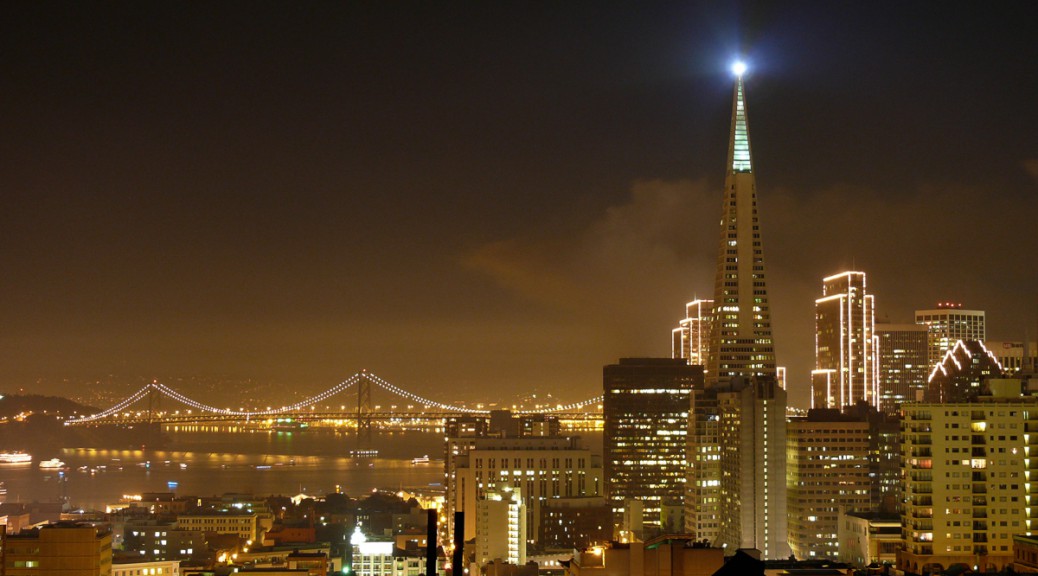[Image: The San Francisco skyline lit up at night, featuring the Bay Bridge and the Transamerica Pyramid.]
Last night I attended a talk by Alicia Garza, co-creator of BlackLivesMatter, on gentrification in San Francisco and the impact on queer* and trans communities of color. I didn’t take photos or take notes, wanting to fully concentrate on her words (and those of her interviewer, professor Nancy Raquel Mirabal, and the audience questions). So I only jotted down some notes from memory afterward.
Garza noted that San Francisco is now the – not one of, but the – most expensive city in the United States. You could literally buy a castle in France for the price of a San Francisco apartment. As I said in my earlier post about gentrification, I have no trouble believing this, having seen the astronomical rise in rents and real estate prices in the 12 years I’ve lived here. She explained that queer and trans people come to live here to be our authentic selves, but we’re now being priced out, as we cannot compete economically with our hetero and cis counterparts.
Queer and trans people face job discrimination, even here in San Francisco. Only those who conform to cisheteronormative standards have a chance of competing. Being a person of color on top of being queer and/or trans just doubles or triples the challenge.
Garza, a native resident of the area, described the changes gentrification has brought to the city, including the loss of black residents, especially black families in the Hunters Point area. She said the black population of San Francisco is now down close to three percent. Blacks are encouraged with respectability politics to cooperate with these city planning strategies, which have been in motion for quite some time.
On this anniversary of 9/11, Garza said that it’s no coincidence that Fox News pundits have been referring to BlackLivesMatter activists as “terrorists.” “Hate group,” “criminal organization,” and “murder movement” are other phrases I’ve found Fox using to describe the BLM movement. It speaks volumes about the entrenchment of white supremacy that disenfranchised people speaking out for their rights and lives can be branded in this fashion.
One observation Garza made that stuck with me is that under capitalism, everything and everyone is a product. Like myself, she believes that we cannot have true reform under a capitalist system. “Shinier, nicer” capitalism is still a tool of exploitation. I’ve been exploring socialism and anarchism and trying to determine what system is the most likely to bring lasting peace to all beings. I’ll write a longer entry on this subject in the near future.
I’m glad I attended this talk, even though it made me angry, even more than I already was. I’m very fortunate and privileged to live in this city, but I’m really uneasy about it. I don’t like living in a place where only rich people are welcomed or wanted. I’m dependent on my spouse’s income and on our rent-controlled apartment so I don’t have the option to move right now, but I can at least bring more awareness to the inequality, racism, and cissexism in this supposedly ultra-progressive place.
* In her talk, Garza used “queer” as an umbrella term roughly synonymous with LGBTQIA+. I recognize that not everyone under that acronym has reclaimed the word “queer” from its roots as a slur. Normally in my blog I use the word “queer” only to describe my own sexual orientation or to describe other individuals who explicitly identify with that term.

Hey Pax, we’d be interested in using this blog post in our newsletter as a write up of the event, of course while crediting you and linking to your website. Let me know if that feels like a good fit, and of course no worries at all if it doesnt!
Feel free – thanks for asking! Please e-mail me a link when the newsletter comes out – I’m avoiding Facebook for the time being.